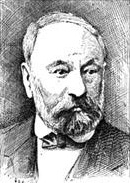You can help expand this article with text translated from the corresponding article in French. (December 2009) Click for important translation instructions.
|

Leopold Dukes (Hungarian: Dukes Lipót; 17 January 1810, Pozsony – 3 August 1891, Vienna) was a Hungarian critic of Jewish literature.
Biography
Dukes spent about 20 years in England, and from his researches in the Bodleian Library and the British Museum (which contain two of the most valuable Hebrew libraries in the world) Dukes was able to complete the work of Leopold Zunz. The most popular work of Dukes was his Rabbinische Blumenlese (1844), in which he collected the rabbinic proverbs and illustrated them from the gnomic literatures of other peoples.
Dukes made many contributions to philology, but his best work was connected with the medieval Hebrew poetry, especially Ibn Gabirol.
See also
References
- ^ Abrahams 1911, p. 651.
- Attribution
 This article incorporates text from a publication now in the public domain: Abrahams, Israel (1911). "Dukes, Leopold". In Chisholm, Hugh (ed.). Encyclopædia Britannica. Vol. 8 (11th ed.). Cambridge University Press. p. 651.
This article incorporates text from a publication now in the public domain: Abrahams, Israel (1911). "Dukes, Leopold". In Chisholm, Hugh (ed.). Encyclopædia Britannica. Vol. 8 (11th ed.). Cambridge University Press. p. 651.
External links
- Works by or about Leopold Dukes at the Internet Archive
- Jewish Encyclopedia entry written by Isidore Singer & Isaac Broydé
- Digitized works by Leopold Dukes at the Leo Baeck Institute, New York
This article about a Hungarian writer or poet is a stub. You can help Misplaced Pages by expanding it. |
This article related to Jewish history is a stub. You can help Misplaced Pages by expanding it. |
This biographical article about a person notable in connection with Judaism is a stub. You can help Misplaced Pages by expanding it. |